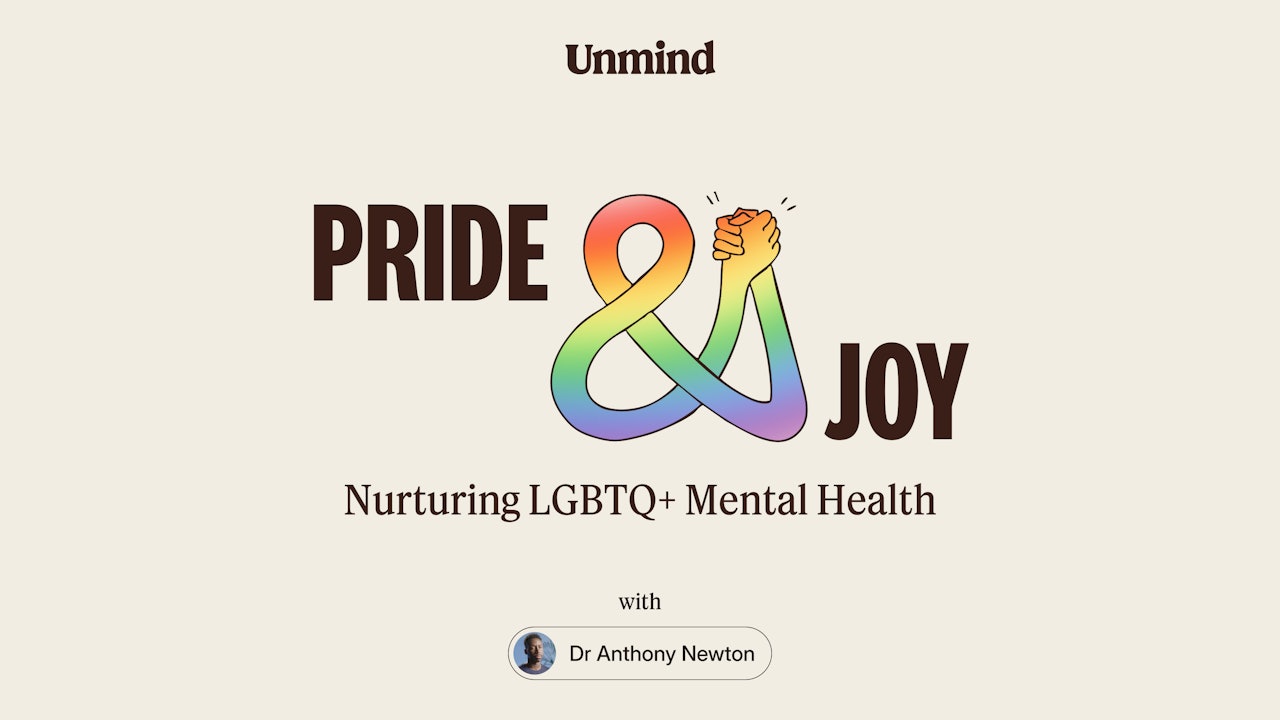Pride & Joy: What it Really Means to Support LGBTQ+ Mental Health

Raya Moshiri
26 June 2025

Content
- Pride & Joy: What it Really Means to Support LGBTQ+ Mental Health
- The pressure behind being ‘out’
- Identity isn’t one-dimensional
- Why joy matters
- What real allyship looks like
- Rest is part of the work
- You’re already enough
Pride & Joy: What it Really Means to Support LGBTQ+ Mental Health
Pride Month is often seen as a time for celebration. But for many LGBTQ+ people, it also comes with reflection – on how far we’ve come, and how much further there is to go.
That’s exactly what Dr. Anthony Newton explored in our recent Unmind webinar, Pride & Joy: Nurturing LGBTQ+ Mental Health. As a psychologist, Unmind contributor, and proud gay Black man, Anthony shared personal reflections alongside practical tools to support LGBTQ+ mental health, at work and beyond.
“Pride is about truth,” Anthony explained. “It’s about showing up as who you are, even when the world makes that hard.”
The pressure behind being ‘out’
For LGBTQ+ people, daily life can feel like a constant mental calculation:
- Will I be safe here?
- Should I correct that assumption – or stay quiet?
- Can I be myself at work?
Anthony described how this added pressure, known as minority stress, often builds quietly over time. “It shows up in the hesitation before holding your partner’s hand, in the decision to stay silent in a meeting, in the constant self-checking,” he shared.
That constant tension takes a toll – leading to anxiety, burnout, and feelings of isolation. And it’s not always visible to those not living it.
Identity isn’t one-dimensional
A big part of supporting LGBTQ+ mental health is understanding that no one shows up with just one identity. We carry layers – race, gender, sexuality, ability, class, that shape how we experience the world.
“We’re not just one identity at a time,” Anthony said. “Our experiences overlap, and so do the barriers we face.”
For some, those intersections can mean facing exclusion from multiple angles. Real inclusion means recognising people’s whole selves, not flattening them to one label.
Why joy matters
Despite the challenges, joy remains essential, and it doesn’t always look like a parade. Sometimes it’s a small, quiet moment where you feel seen. Sometimes it's an unapologetic celebration – like Anthony’s love for Beyoncé concerts.
“Queer joy is about choosing how you live, finding your people, and letting go of who the world tells you to be,” he explained.
Moments of connection, laughter, and self-expression aren’t extras – they’re a vital part of resilience.
What real allyship looks like
Supporting LGBTQ+ mental health doesn’t require grand gestures – it shows up in the everyday details:
- Adding pronouns to your signature
- Listening without needing to centre yourself
- Speaking up when you see exclusion
“Allyship doesn’t need to be performative,” Anthony reminded us. “It’s in the details – how you show up, how you make space, how you’re willing to get it wrong and keep learning.”
Rest is part of the work
The session also highlighted the importance of rest, especially for those carrying the weight of discrimination or exclusion.
“Rest is resistance,” Anthony shared. “In a world that drains us, choosing to recharge is an act of defiance.”
Whether it’s switching off, setting boundaries, or finding moments of quiet, rest is how we look after ourselves – and each other.
You’re already enough
At the core of Anthony’s message was one simple, powerful truth:
“You’re not required to prove your worth to anyone, not your workplace, not your family, not even yourself. You’re already enough.”
Mental health, belonging, and inclusion aren’t optional extras, they’re essential. And it takes all of us to create spaces where LGBTQ+ people can thrive.
Catch the full conversation – hear Anthony’s story and get practical tools to support LGBTQ+ mental health.
About the Author

Raya Moshiri, Marketing Associate
I’m Raya Moshiri, and I help organizations bring proactive mental health support to life by coordinating programs, resources, and experiences that drive engagement and real-world impact. Based in New York, I’m dedicated to making workplace wellbeing both attainable and actionable.
About the Author

Raya Moshiri, Marketing Associate
I’m Raya Moshiri, and I help organizations bring proactive mental health support to life by coordinating programs, resources, and experiences that drive engagement and real-world impact. Based in New York, I’m dedicated to making workplace wellbeing both attainable and actionable.